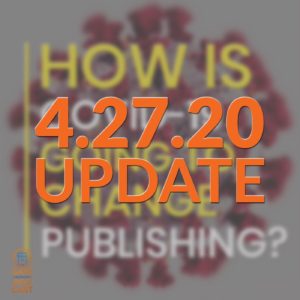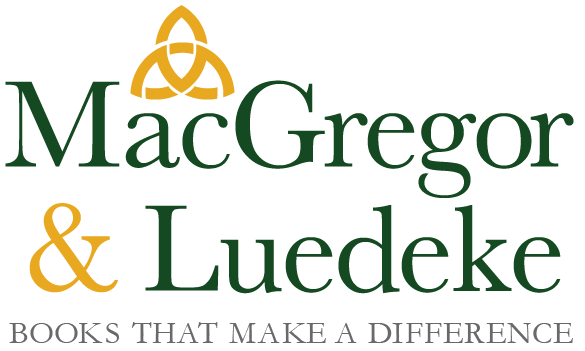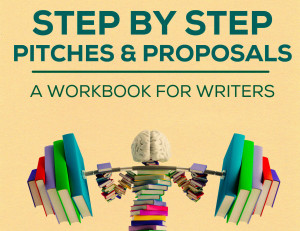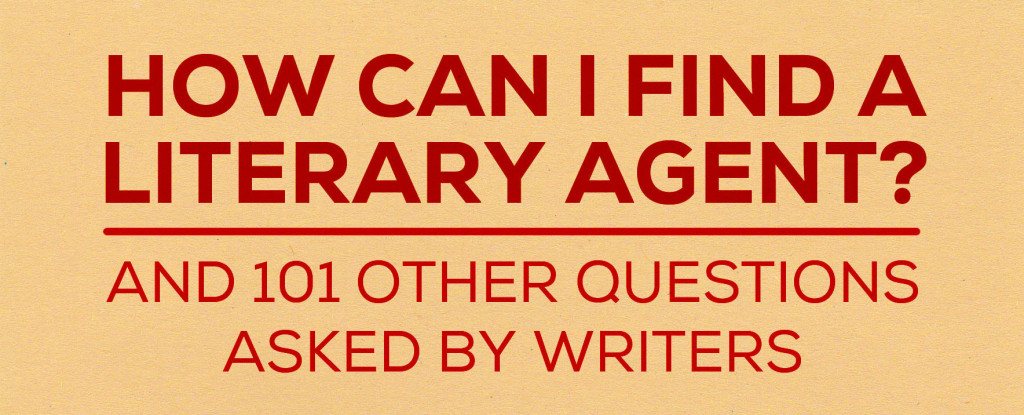- Agents
- Author News, Deals
- Awards
- Bad Poetry
- Blog News
- Books
- Career
- CBA
- Collaborating and Ghosting
- Conferences
- Current Affairs
- Deep Thoughts
- Favorite Books
- Featured
- Film
- Marketing and Platforms
- Proposals
- Publishing
- Questions from Beginners
- Quick Tips
- Religion
- Resources for Writing
- Self-Publishing
- Social Media Critique
- The Business of Writing
- The Writing Craft
- Thursdays with Amanda
- Trends
- Uncategorized
- Web/Tech
Category : Publishing
-
Continue Reading "How COVID-19 Is Affecting Book Publishing"
How COVID-19 Is Affecting Book Publishing
 Some publishers are laying people off.
Some publishers are laying people off.Some bookstores are launching GoFundMe campaigns to stay afloat.
And many authors have seen massive income hits.
In this week’s episode of our Gatecrasher’s Podcast, Amanda Luedeke and her cohost Charis Crowe discuss a number of publishing headlines as they relate to the current worldwide pandemic.
Listen here for a quick look into how the COVID-19 pandemic is affecting book publishing.

-
Continue Reading "Here’s Where to Get Your Industry Fix — The Gatecrashers Podcast"
Here’s Where to Get Your Industry Fix — The Gatecrashers Podcast
 For quite awhile on this blog I had a weekly column entitled Thursdays with Amanda. I’d talk primarily about marketing, since that was my background, and try to help authors navigate what can oftentimes seem like a mystery. It led to a book and countless conversations with authors who wanted to better understand how to be smart about book marketing.
For quite awhile on this blog I had a weekly column entitled Thursdays with Amanda. I’d talk primarily about marketing, since that was my background, and try to help authors navigate what can oftentimes seem like a mystery. It led to a book and countless conversations with authors who wanted to better understand how to be smart about book marketing.Then, some years ago we decided to take a break from blogging. It was taking up a lot of time and Chip and I were both busy pursuing career growth.
But last fall, I got the itch to once again share what I know with authors.
And so The Gatecrashers Podcast was born.
This isn’t your typical podcast of author interviews or happy talk. This is an industry-focused weekly show in which we “storm the gates of publishing and dare to talk about the realities of the industry.”
Some of the topics we’ve covered include:
- How do publishers determine marketing budgets?
- What agents aren’t telling you …
- The biggest mistakes you’re likely to make …
- How will COVID-19 affect book publishing?
- And more.
My cohost, Charis Crowe, brings insight from the self-publishing world while I offer ten years of experience in the industry as a book agent and now V-P of MacGregor & Luedeke.
I hope you’ll give us a listen. And if you’re on Facebook, find me at Facebook.com/AgentAmandaLuedeke. There, I post my deals, share info, and interact with my followers.
-
Continue Reading "We’re Proud to Announce ‘MacGregor & Luedeke’"
We’re Proud to Announce ‘MacGregor & Luedeke’

We have a new logo and a new partnership!
For the past ten years, we (Chip & Amanda) have worked as colleagues, serving authors and doing our part to make books happen. We are thrilled for this next chapter.
As announced last week, MacGregor Literary will now be operating as MacGregor & Luedeke. Amanda has been made partner, further solidifying her role with the agency.
Agenting continues to be our passion. The industry is constantly changing, but we continue to do business we’re proud of, representing authors and projects we believe in.
To the future!
Chip MacGregor & Amanda Luedeke
-
Continue Reading "Questions you’d ask an agent…"
Questions you’d ask an agent…
So this month we’re going to let you ask whatever you’ve always wanted to ask a literary agent. You send me the questions (or send them to me on Facebook, or stick them in the “comments” section), and I’ll try to answer them, or get another agent to answer them. First up, some questions that came in last month…
Suppose you have a character in your novel that would be perfect for a particular actor. Should you tell your agent about it and let them handle it?
You could… but it probably won’t get very far. It’s rare that a project gets pitched to an actor in a role, unless it’s a major author with clout. (So, for example, if you had a role that was perfect for Leonardo DiCaprio, you could try and talk with his agent. Um, and you would be author #5962 who has the “perfect” role for him.)
If I have an agent, then decide to write a self-pubbed novel, how can I include my agent in the process?
This is one of the things happening in publishing these days that is still in process, so there’s no one right answer for every situation. You could ask your agent to help you with it — the editing, the copyediting, the formatting, the uploading, the cover, etc., then pay a percentage as a commission. OR you could see if your friends are producing a line of books, make it part of that line, and pay a certain commission to him or her. (For example, we helped our authors create a co-op line of clean romances.) OR you could do it all yourself and not pay the agent anything. OR you could do it yourself, but work with your agent to help with things like marketing and selling, and pay a commission.
I am brand new to the industry, and delving into the potential of writing fiction. So
-
Continue Reading "Ask the Agent: What do I do with a bad review?"
Ask the Agent: What do I do with a bad review?
Someone wrote to say, “I got a terrible review on Amazon. I hate even going there to look at it. Tell me, what do you do with a bad review?”
You know, one of the things unpublished authors don’t realize is that once you put something into print, it’s there forever. If you say something stupid, you’re stuck with it. You can go to the person and apologize, but the words are still out there, waiting to be discovered by millions of other potential readers who will never get to hear your personal explanation or apology.
Writing is a scary thing.
I’ve often done fairly blunt assessments of books and articles, and at times I’ve hurt people’s feelings. But I never set out to do that. I mean, it’s not like I saw the book, didn’t like the author, and decided to toast them just for fun. When I’ve said something was stupid or badly written, it was because I was trying to offer an honest evaluation of a project. But that’s not universally respected. Let’s face it — plenty of people ONLY want you to stay something nice, or to say nothing at all.
So if you’re asked to review a book that’s awful, what are you supposed to do? Lie about it? It seems to me like the best thing to do is to be honest but as gracious as possible, speaking the truth (or at least the truth as you see it) in love. It’s those sorts of jobs that can get you into trouble.
Unfortunately, a bad review like that can hurt an author’s career (to say nothing of the author’s feelings). So I find that when I’m simply asked to review a book for a friend, I tend to simply stay away from reviewing a book I didn’t love. That means the title will get a falsely-positive set of reviews, but I don’t have to
-
Continue Reading "Ask the Agent: How does a book get selected by a publisher?"
Ask the Agent: How does a book get selected by a publisher?
As we jump into the new year, I’ve had several people write to ask, “What is the process of getting your proposal selected by a publishing house?”
‘
Okay. First, think of a publishing house as being an actual building. Your proposal probably isn’t walking in the front door. More than likely it’s sliding into the building by way of a window known as an acquisitions editor (often an acquaintance of your agent, sometimes a person you met at a conference, or maybe a guy who lost a bet). He or she will read through it, make some suggestions, talk it over with your agent, and eventually make a decision on whether or not they think it’s worth pursuing.‘
Most publishers are relying on agents to do the initial filtering of junk, so the slush pile has sort of moved from the publishing house to the agent’s office…which means you’re probably going to have to sell it to an agent first, therefore adding one more step to this process.‘
Once it’s actually in the building, if the acquisitions editor likes it he or she will take it to some sort of editorial committee, where they sit around grousing about their pay and making editorial jokes. (“I’m having a DICKENS of a time with this one!” “Yeah, let’s catch a TWAIN out of town!” Editorial types love this sort of humor. That’s why they’re editors and not writers.) Eventually they’ll run out of bad puns and be forced to discuss the merits of your proposal. If it’s a non-fiction book, is it unique? Does it answer a question people are asking? Is there a perceived market for it? Does the writing feel fresh and offer genuine solutions to the question that’s posed? If it’s a novel, does the story have a clear hook? Is there a well-defined audience for it? Does it feel new, or as though it’s -
Continue Reading "What have you always wanted to ask an agent?"
What have you always wanted to ask an agent?
I started this blog nearly ten years ago (we’re coming up on the ten year anniversary for this blog), as a way to simply answer the questions writers have about the process. Some people wanted to ask about writing, others about publishing, still others about marketing. Writers asked about careers, they asked about proposals, and they asked about contracts. Lately we’ve had a ton of people asking about indie publishing and working with Amazon to become a hybrid author.
Over the next couple of months, I thought we’d do an “ask me anything” segment. So… what have you always wanted to ask a literary agent? I’ve got a backlog of questions, but I thought I’d begin by simply asking the people who read this blog a question: If you could sit with me over a cup of coffee or a glass of wine somewhere, and ask anything you wanted, what would you want to know? What would you like to chat about?
Drop a question in the “comments” section below, or send me an email at chip (at) macgregorliterary(dot)com, and I’ll try to offer short answers to your questions. You can ask about books, about proposals, about writing, career planning, marketing, platforms, proposals, or anything else. If I don’t know an answer, I’ll ask someone who does. If they don’t know, I’ll just make up something that sounds good. (Or maybe I’ll ask someone else.)
So there you have it — October is gong to be “ask the agent” month. Send me your tired, your poor, your huddled questions yearning to breath free. I’ll do my best to get you a good response.
-Chip
-
Continue Reading "Ask the Agent: What if my novel doesn’t fit?"
Ask the Agent: What if my novel doesn’t fit?
All through the month of April we’re doing “Ask the Agent” — your chance to ask a literary agent the question you’ve always wanted to ask. Last week someone sent in this question: “If your manuscript isn’t the right fit for the agents you query, should you move on to the next book or self-publish? How do you decide if your project is good enough to go out if it doesn’t have a gatekeeper stamp of approval?”
Your first question suggests there is a right-or-wrong answer. The fact is, if your manuscript isn’t the right fit for the agents you query, perhaps you need to query other agents. Or perhaps you need to tweak your proposal. (I’m not trying to be cruel here, but if a bunch of people have seen your proposal and all rejected it, then it’s always possible the proposal simply needs some more work.) I just don’t see this as an either/or question.
That said, I think your second question gets to the heart of the matter: How can a writer know if his or her proposal is ready to be shown to agents and editors? And the answer is no doubt, “By getting some experienced opinions.” Taking your proposal to a critique group can help, or taking it to a couple of experienced writer friends and asking them to suggest changes. Many conferences have workshops on how to create a good proposal, and most will give you a chance to talk with editors and agents about the proposal itself — not just to pitch it, but to refine it. All of those are good options. And, of course, if you need more help, there is always this fabulous book to peruse…

Okay, I’ll admit… I wrote it with longtime editor Holly Lorincz, and I love the topic. There are plenty of good books out there on “how to create a good proposal.” What’s unique
-
Continue Reading "Coming in April: “Ask the Agent”"
Coming in April: “Ask the Agent”
What is it you’ve always wanted to ask an agent? I mean, if you could sit down for a few minutes over a cup of coffee and ask a literary agent anything — about proposals, or writing, or marketing, or the process, or the economics of publishing, or anything else — what would you ask?
Here’s your chance. Starting April 1st, we’re going to take a month and just focus on the questions writers have for literary agents. What do you want to know? What do you need clarified? What is it you’ve always wanted to ask (or ask again)? I’ll be taking a slug of questions each day and offering my best response.
So come join the conversation! Either go to the comments section below and drop in your question, or send me an email asking the question you’ve long wanted answered. I promise to try and get to all of them in the month of April. Looking forward to seeing what you send me.
Don’t just sit there — ASK!
-
Continue Reading "Thursdays with Amanda: The Numbers Behind an Author Platform"
Thursdays with Amanda: The Numbers Behind an Author Platform
 OK, nonfiction writers. You’ve heard it before. If you really want to impress an agent or a publisher, make sure you have three things: a great idea, great writing, and a great author platform.
OK, nonfiction writers. You’ve heard it before. If you really want to impress an agent or a publisher, make sure you have three things: a great idea, great writing, and a great author platform.But more and more, platform is becoming THE way to secure a book deal.
This is because while writing can be fixed or edited and the idea can be tweaked, platform has to happen organically.
It can’t happen by chance. It can’t be bought. It’s about hard work over a period of time and it’s something that only the author can bring to the table.
So what do impressive social media stats look like?
Brace yourselves. Winter is coming.
A decent nonfiction author platform has a handful of the following components:
If you have a website or blog your monthly unique visitor count should be at least 30,000
(a unique visitor number of 100,000 is likely to secure a book deal)If you have a Twitter account your followers should be at least 10,000 (and you should have stats that show considerable growth over the past six months)
If you have a Facebook page you should have at least 8,000 likes (along with Insights that show your past and projected growth)
If you’re a public speaker you should speak at least 30 times a year and you should shoot for a newsletter list of at least 10,000
Publishing Is More Competitive Than Ever
Needless to say, these numbers aren’t easy to achieve, and I’ve seen a number of authors who HAVE these numbers come away without a book deal.
But on the flip side, I’ve seen authors with the bare minimum of the above components land a book deal because they also had great writing and a great idea.
So yes. Platform is HUGE. It’s an absolute must if you write fiction. But never underestimate the power of strong, moving writing and a great,



